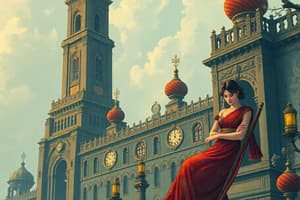Podcast
Questions and Answers
What are the three major categories of suffering mentioned in the text?
What are the three major categories of suffering mentioned in the text?
- Suffering from lack of material possessions, existential suffering, emotional suffering
- Suffering associated with birth, aging, sickness, and death, separation suffering, associated suffering
- Misery caused by attachment, suffering from past actions, suffering due to impermanence
- Misery caused by physical pain, misery caused by change, misery caused by conditioning (correct)
Why might pleasant sensations be a cause of suffering?
Why might pleasant sensations be a cause of suffering?
- Because they are always associated with negative consequences
- Because they result in attachment to material possessions
- Because they are enjoyable in the short term but lead to long-term suffering
- Because they are impermanent and eventually turn into pain (correct)
What are the four types of suffering associated with the Buddha's quest for enlightenment?
What are the four types of suffering associated with the Buddha's quest for enlightenment?
- Suffering of separation from loved ones, lack of material possessions, existential suffering, emotional suffering
- Birth, senescence, sickness, death, physical pain, change in sensations, conditioning
- Suffering from past actions, attachment to impermanence, dependency on objects, mental pain
- Suffering of birth, aging, sickness, death; separation from loved ones; association with disliked entities; not getting what one wants (correct)
Why might sensations that are neither painful nor pleasant still be a cause of suffering?
Why might sensations that are neither painful nor pleasant still be a cause of suffering?
What additional four types of suffering are included in the eight types of suffering?
What additional four types of suffering are included in the eight types of suffering?
How does conditioning contribute to the category of suffering according to the text?
How does conditioning contribute to the category of suffering according to the text?
Why is separation from persons and things one likes considered a type of suffering?
Why is separation from persons and things one likes considered a type of suffering?
'The suffering inherent in the five aggregates that are objects of clinging' refers to:
'The suffering inherent in the five aggregates that are objects of clinging' refers to:
'Senescence' mentioned in the text can be best described as:
'Senescence' mentioned in the text can be best described as:
Flashcards are hidden until you start studying
Study Notes
The Truman Show and Buddhist Themes
- The film "The Truman Show" explores themes of entertainment, media control, and states of surveillance, showcasing Christof's control over Truman's reality and information.
- Christof's actions can be seen as a form of "playing God," as he manipulates Truman's life, including engineering his father's death to instill a fear of travel by boat.
- Despite Christof's care for Truman, he keeps him prisoner by hiding the truth, illustrating the tension between protection and control.
Buddhist Themes – Renunciation & the Search for Truth
- Truman's journey parallels Siddhartha Gautama's life, both having privileged and sheltered lives, yet seeking knowledge and experience beyond their confines.
- Truman's desire for truth and freedom from his manufactured reality mirrors Siddhartha's quest for enlightenment.
Buddhist Themes – Illusion
- The concept of "maya" or "samsara" in Buddhism suggests that the world we perceive is an illusion.
- Truman's artificial reality in Seahaven Island can be seen as a metaphor for the illusory nature of reality.
- Breaking free from illusion is a key concept in Buddhism, and Truman's quest for freedom and self-realization reflects this idea.
The Five Aggregates
- The five aggregates, or "skandhas," are factors that comprise the self:
- Form (physical world and sense organs)
- Feelings (sensations of pleasure, pain, or neutral)
- Discriminations (differentiations of objects of perception)
- Compositional factors (volitional activities, including karma)
- Consciousness (six types of consciousness: eye, ear, nose, tongue, body, and mind)
The Two Truths: Relative and Ultimate
- Relative truth, or conventional truth, refers to the objects of everyday experience.
- Ultimate truth, or supreme object truth, refers to realities that exist as they appear and can lead to liberation.
- In Madhyamaka, conventional truths are all phenomena except emptiness (śūnyatā), which is the ultimate truth.
Suffering (duḥkha)
- Suffering, or duḥkha, is the first of the Four Noble Truths of Buddhism.
- It encompasses not only physical and mental suffering but also mental, emotional, and spiritual dissatisfactions inherent to life.
- The three major categories of suffering are:
- Misery caused by (physical and mental) suffering
- Misery caused by change
- Misery caused by conditioning
- The eight types of suffering include those associated with birth, aging, sickness, and death, as well as four additional types related to separation, association, and unfulfilled desires.
Studying That Suits You
Use AI to generate personalized quizzes and flashcards to suit your learning preferences.




